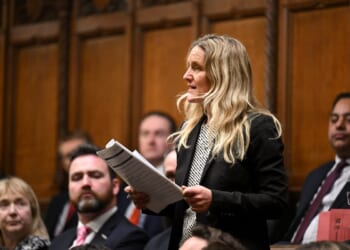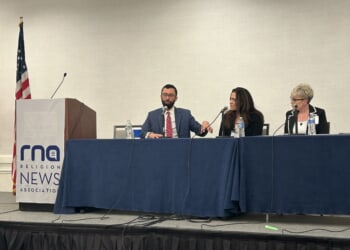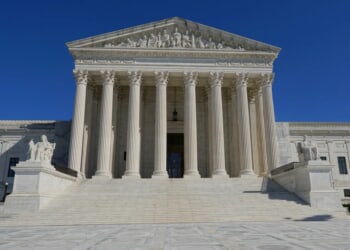
A bill meant to halt deep cuts to the District’s budget has been stalled in the House for nearly a month as House Republicans try to get President Trump’s agenda off the ground.
The Senate passed the measure late last month to correct a mistake in the GOP-authored government funding extension that could result in a slash to the District’s budget of over $1 billion, but so far House leadership has not made plans for the bill.
Mr. Trump supports the bill, and urged House Republicans to “immediately” pass it.
House Speaker Mike Johnson, Louisiana Republican, has devoted much of the House’s floor time since the budget fix was passed in the upper chamber to advancing the president’s agenda through the budget reconciliation process.
But an abrupt end to votes last week in a bid to kill a push to allow proxy voting ate away at valuable floor time.
And since returning this week, Republicans have been heavily focused on trying to coalesce behind a Senate-altered budget blueprint that would unlock the filibuster-proof reconciliation process where Republicans plan to cram sweeping energy, defense, border and tax policy into one “big, beautiful bill.”
While Mr. Trump’s agenda has dominated the House GOP’s focus, the speaker and D.C. Mayor Muriel Bowser have been in touch, a source familiar with the talks told The Washington Times.
“Speaker Johnson and Mayor Bowser spoke on a call this week to discuss the D.C. funding issue as the House determines a path forward,” the source said.
Ms. Bowser’s office declined a request for comment.
Further complicating the measure’s road ahead are demands from hardliners in the conservative House Freedom Caucus that the bill be amended to add conservative priorities.
Rep. Andy Harris, Maryland Republican and the Freedom Caucus chairman, suggested a number of different options for amendments to the bill, including incorporating cooperation with federal officials on deportations of illegal migrants or ensuring that the district is “not wasting money” on Diversity, Equity and Inclusion programs.
“We definitely should not give them that spending authority without putting some restrictions on them,” Mr. Harris said.
D.C. officials warned that if the bill does not pass, it would effectively blow a $1.1 billion hole in the District’s budget that would have to be cut by Sept. 30, the end of this fiscal year. That’s because last month’s government funding extension treated the city like a federal agency, and would require that the District return to its budget for fiscal 2024.
Another Freedom Caucus member, Rep. Andy Ogles of Tennessee, would like to see his bill, the Bringing Oversight to Washington and Safety to Every Resident (BOWSER) Act added to the measure.
His legislation would repeal the five-decade-old D.C. Home Rule Act, which would dissolve the mayor’s office and D.C. council one year after its passage.
“If we’re gonna do a budget fix, we gotta hold them accountable, there has to be guardrails,” Mr. Ogles said.
D.C. Delegate Eleanor Holmes Norton said in a statement that she was “disappointed and exasperated” that the bill has remained delayed.
She argued that the District should be able to spend its own money without interference from members of the Freedom Caucus, who “were not elected by D.C. residents, they are not familiar with the needs of the 700,000 people who live here, and they have no accountability to the District because D.C. residents can’t vote them out of office.”
“To give them a say in how D.C. spends its own local funds would be antidemocratic,” she said. “This ordeal, however, only helps to highlight the need for D.C. statehood so that D.C. can finally govern itself to the same extent afforded to the states, including making decisions about how to use its own local funds.”





![Jasmine Crockett Justifies Mass Illegal Immigration With Bizarre Argument [WATCH]](https://www.right2024.com/wp-content/uploads/2025/03/1742007023_Jasmine-Crockett-Justifies-Mass-Illegal-Immigration-With-Bizarre-Argument-WATCH-350x250.jpg)

![NYC Tourist Helicopter Falls into Hudson River, Siemens Executive and Family Among Those Killed [WATCH]](https://www.right2024.com/wp-content/uploads/2025/04/NYC-Tourist-Helicopter-Falls-into-Hudson-River-Siemens-Executive-and-350x250.jpg)








